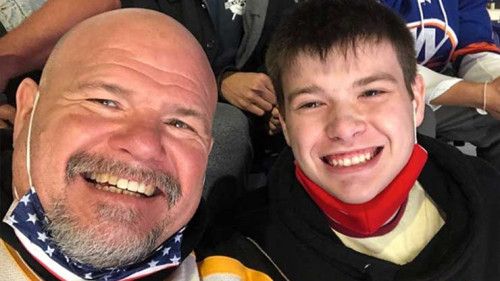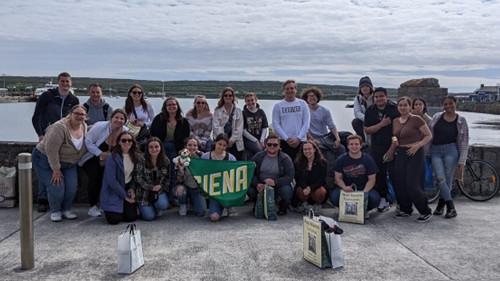
While millions of Americans watch news updates about the invasion of Ukraine, Cristian Spariosu ’23 is paying special attention.
He has extended family in the western region of the beleaguered nation, which has already seen more than millions of citizens refugee to neighboring countries, and has sustained untold numbers of casualties. His mother Ewa and father John were both born and raised in eastern Europe. His mother, especially, is finding it difficult to speak about what is happening overseas.
“You can hear the tears in her voice,” he noted when he calls her back in Queens.
Spariosu joined a panel of Siena faculty on March 9 in the pop-up Zoom presentation “Ukraine: What Led to the Invasion, and Where Do Things Go From Here?” One of the advantages of being part of a college community: during times of great political and social upheaval, the campus can easily connect with faculty and student colleagues to learn and to share experiences.
Following an opening prayer for peace by Fr. Mark Reamer, O.F.M., D.Min., vice president for mission and guardian of the friary, Fr. Dan Dwyer, O.F.M., Ph.D., explored the history of Russo-Ukrainian relations. The associate professor of history traced the complicated political and cultural connections between the two nations, and why Russian President Vladimir Putin is so eager to bring Ukraine under his control.
Vera Eccarius-Kelly, Ph.D., professor of comparative politics, examined the refugee crisis. She explained that it is mostly women and children making up the exodus, as Ukrainian men ages 18 to 60 have been ordered to stay and fight for their country.
Eccarius-Kelly said studies show that three out of 10 refugees never return to their homelands, and the same will most likely be the case for Ukraine, which will have “a profound and painful” impact on divided families, on the nation they fled, and on the countries that are accepting them as refugees.
“This is a traumatic experience for them,” she said, urging the audience to offer support. “All of us, even though we are far away, can do something. Ukrainian families will eventually come to upstate New York, and they will need our friendship. It is an act of humanity to try to help refugees. They have suffered greatly.”
Spariosu agreed, voicing concern that young Ukrainians, especially, will not want to return to their homeland after the political situation has stabilized.
“Ukraine will be behind for years after this,” he said.
James Booker, Ph.D., professor of economics, noted that there are now more than 5,000 sanctions (“an astonishing number”) against Russia levied by the United States, the European Union, Australia and other nations appalled at the unprovoked atrocities being committed against the Ukrainian people. The sanctions include limits on trade, restricting access to commodities and financial services, and even confiscation of the luxury yachts of Russian oligarchs.
In addition, multinational companies such as McDonalds, Coca-Cola, American Express and Starbucks are ceasing business operations in Russia.
“This will result in serious disruptions,” he said. “Modern war is a lose-lose proposition.”
Spariosu said Ukraine has a “very dark past” and that his own family’s history is no exception. His mother grew up poor in Ukraine and without her father, who was banished to a Siberian prison camp for 11 years for stealing a pound of flour to help feed his family. Other family members were killed by the Soviets, or simply “disappeared.”
“My mom is not eager to open up about the past,” he said. “The invasion has stirred up a lot of PTSD for those who lived under Soviet rule. That part of the world has never had an easy time. People are dealing with a lot of anxiety and depression right now.”
He said they are trying to stay in touch with family and friends through social media. Trips back to Ukraine had to be put off in recent years due to COVID travel restrictions, and now with the invasion and its fallout a reunion is now out of the question for the foreseeable future.
Spariosu’s dad has accompanied him to pro-Ukrainian rallies in New York City. He said many Ukrainians feel “betrayed” by Western leaders, who they believe ignored the threat Putin long presented, and are now proceeding too carefully in dealing with the situation.
Siena also held a prayer service on Tuesday, March 15 at 4PM in the Grotto. The campus welcomed Fr. Mikhail Myshchuk, the pastor at St. Nicholas Ukrainian Catholic Church in Watervliet, to stand in prayer and solidarity with the people of Ukraine.
For those wishing to help humanitarian efforts:
https://franciscanrelieffund.org
https://www.directrelief.org/emergency/ukraine-crisis/
https://www.globalgiving.org/projects/ukraine-crisis-relief-fund/
https://support.savethechildren.org/site/Donation2?df_id=5751&mfc_pref=T&5751.donation=form1

